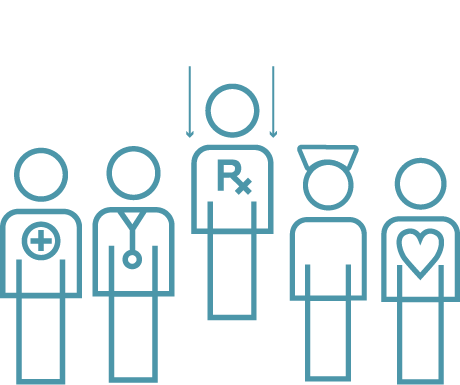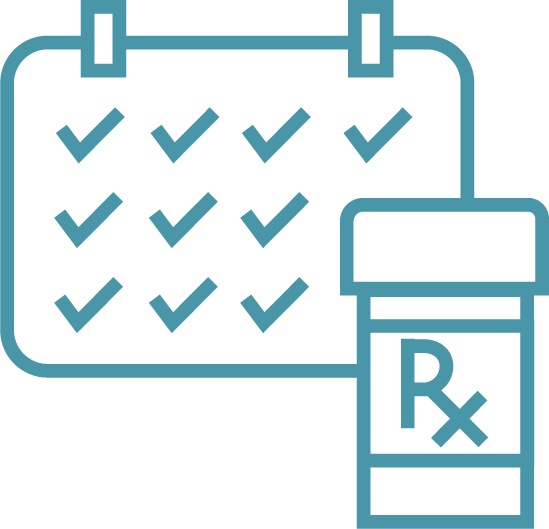Studies have consistently demonstrated that pharmacist-led care initiatives contribute to reductions in costs and improved patient outcomes in a wide variety of healthcare settings.1 Programs that improve medication adherence are among the most impactful. In a study of Medicaid patients with congestive heart failure, the group of patients who best adhered to their medications had fewer hospitalizations and fewer emergency department visits, ultimately incurring 23% lower overall health care costs.2
Because of results like this, organizations committed to delivering value-based care should take a closer look at how pharmacists can contribute to improving medication adherence.
How bad is it? Medication adherence in the U.S.
Medication adherence means taking medications in the right dose, at the right time, in the right way, and at the right frequency as prescribed on an ongoing basis. Unfortunately, high adherence is the exception:

It’s estimated that three out of four Americans don’t take their medication as it should be taken.3
Consider:4
- 20% to 30% of new prescriptions are never filled
- Among patients prescribed medications for chronic conditions, the majority take less medication than prescribed—or have stopped the medication completely after 6 months
- Only 51% of patients taking medications for high blood pressure continue taking their medication throughout their long-term treatment
Based on the data available, medication adherence leaves a lot of room for improvement. But how strongly is non-adherence associated with negative outcomes?
Downstream effects of poor medication adherence
Poor medication adherence leads to many problems. Some may be apparent in short order. Others might take months or even years to appear. Almost all mean elevated risks for patients, and an increased cost of care.
For example, when patients with chronic conditions like hypertension fail to take their medication as directed, the repercussions can be severe. Not keeping blood pressure in check can lead to heart disease, stroke, and/or kidney failure.3 A quarter to a half of patients being treated with statins who stop their therapy within one year have up to a 25% increased risk of dying.4 The Centers for Disease Control and Prevention (CDC) estimates that non-adherence causes 30% to 50% of chronic disease treatment failures and 125,000 deaths per year in the U.S.4 Poor medication adherence ultimately costs the American health care system nearly $300 billion per year in doctor visits, emergency department visits, and hospitalizations.3
It has been shown that putting pharmacists in a position to monitor and advise patients can improve medication adherence by up to 30%, reduce 30-day hospital readmissions by 24%, and reduce ED visits by 30%.5
Integrate pharmacists into care teams

The Surgeon General’s 2020 Call to Action to Control Hypertension encourages including pharmacists as integral members of care teams as a strategy for supporting medication adherence.6 Collaboration to ensure timely refills and overcome other adherence barriers is one of the most impactful opportunities for plans, providers, and pharmacies concerned about value in healthcare. A pharmacy that proactively coordinates with prescribers helps health plan members overcome routine challenges to medication access and adherence.
Pharmacist-based interventions can support adherence through use of assessment tools employed to identify adherence barriers. A pharmacist can use the results obtained from a patient’s assessment to develop and deliver tailored guidance and services that aim to remove or reduce identified barriers. Useful services can be as simple as providing pillboxes, medication cards, and calendars. Other interventions might consist of patient education materials or communication between the pharmacist and the patient’s primary care provider.7
Adherence earns stars

Medication adherence is an important factor in determining the star ratings for health plans and is triple weighted in the rating system. Specifically, The Centers for Medicare and Medicaid Services (CMS) evaluates medication adherence for several chronic conditions, including hypertension, diabetes, and hypercholesterolemia. Health plans are rated based on the proportion of their members who are adherent to their medications for these conditions. High performance in these measures prevents future spikes in health care costs and downstream health issues for patients. And positive star ratings can drive millions of dollars in incremental revenue, supporting the plan’s mission to deliver quality care to covered lives.
Prioritize adherence to improve outcomes

When members take their medications as prescribed, they are more likely to have better health outcomes, including improved control of chronic conditions and reduced risk of medication-related issues. Health plans that prioritize adherence as a key component of their value-based care strategies can improve quality of care, reduce healthcare costs, and optimize overall value for their members.
Share this: